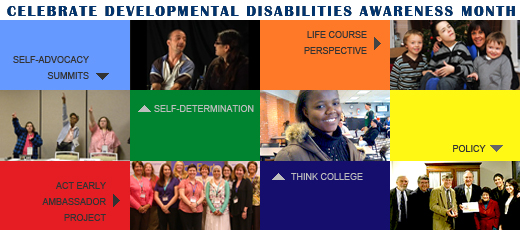AUCD Celebrates March as Developmental Disabilities Month
March 1, 2012

|
On February 26, 1987, President Ronald Reagan designated March as the National Developmental Disabilities Awareness Month. The language of the official Proclamation indicates that before the 1990 Americans with Disabilities Act, Americans were changing their perceptions about people with disabilities. It applauded efforts by the federal government and the private sector to work with advocacy organizations on measures that would help these people achieve "their full potential in school, at work, or at home." Twenty-five years later, the focus of the month continues to promote acceptance, independence, and self-determination.
The Association of University Centers on Disabilities (AUCD), located in Silver Spring, MD, promotes and supports a national network of interdisciplinary centers on disabilities. The members of AUCD represent every US state and territory and include 67 University Centers for Excellence in Developmental Disabilities (UCEDD), 43 Interdisciplinary Leadership Education in Neurodevelopmental and Related Disabilities (LEND) Programs and 19 Intellectual and Developmental Disabilities Research Centers (IDDRC).
AUCD and our national networks work every day to "advance policy and practice through research, education, leadership, and services for and with individuals with developmental and other disabilities, their families and communities, in support of independence, productivity, and satisfying quality of life." Following are just a few of the highlights of AUCD's current activities in diagnosis, treatment, supports, professional training, research, and education.
 |
Self-advocacy has been a cornerstone of the Developmental Disabilities movement in the United States, starting over 35 years ago with the original People First organizing efforts. ADD is holding numerous "Allies in Self-Advocacy" regional self-advocacy summits to (1) Find out what is happening in the states on self-advocacy, (2) Make state team plans to strengthen self-advocacy, and (3) Make national recommendations to strengthen self-advocacy.
 |
AUCD advocates for a number of legislative issues that are critical to individuals with disabilities and their families. Legislative priority issues are developed bi-annually by the AUCD Legislative Affairs Committee and Board of Directors. Priority issues are based on the Association's vision and mission as well as input from the entire Network, including individuals with disabilities and their families. Some issues AUCD is actively acvocating for include Medicaid, health care reform, family support, education, employment, research, and autism.
 |
AUCD partners with CDC's NCBDDD and HRSA's MCHB on the "Learn the Signs. Act Early." campaign. The campaign aims to educate parents about childhood development, including early warning signs of autism and other developmental disorders, and encourages developmental screening and intervention. "Learn the Signs. Act Early." builds on familiar experiences of parents, such as monitoring their children's physical growth, and expands to social and emotional milestones such as how children speak, learn, act, and play. As part of this initiative, AUCD supports a grown network of Act Early Ambassadors who serve as state liaisons to the Act Early Initiative and act as a community champion or change agent to increase awareness activities and improvement of early identification practices.
 |
The life course perspective or life course theory (LCT) is a multidisciplinary approach to understanding the mental, physical and social health of individuals, which incorporates both life span and life stage concepts that determine an individual or group's health trajectory. AUCD, in concert with MCHB and other leadership training programs, developed a set of resources to assist programs in teaching trainees about the life course perspective.
National Gateway to Self-Determination
 |
Self-determination is the characteristic of a person that leads them to make choices and decisions based on their own preferences and interests, to monitor and regulate their own actions, and to be goal-oriented and self-directing. The National Gateway to Self-Determination provides a single access for self-advocates, professionals, policy-makers and the general public on the current best practices and evidence-based activities in enhancing self-determination in the lives of people with developmental and intellectual disabilities, as well as any individual.
 |







